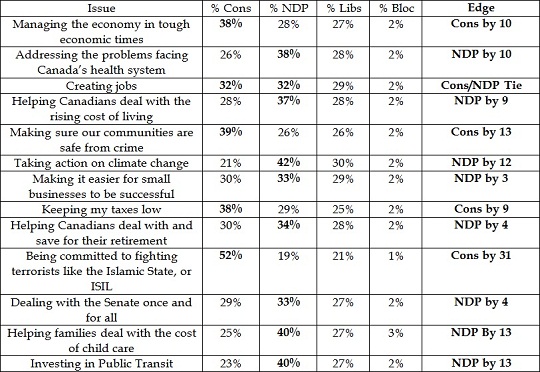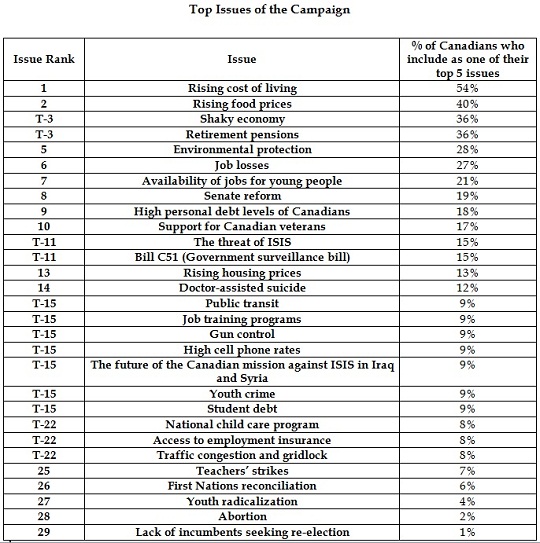Canadian Voters say Managing Economy in Tough Times (76%),
Fixing Healthcare (73%) and Creating Jobs (73%) are Absolutely Crucial Policy Planks for Parties to Address to Win their Vote
Rising to the top of the list is `managing the economy in tough economic times', with 76% of voters saying it's `absolutely crucial' to know where the parties stand on this policy before determining how they will vote. Tied for second are `addressing the problems facing Canada's health system' (73%) and `creating jobs' (73%). Two in three (64%) say it's absolutely crucial to know where a party stands on `helping Canadians deal with the rising cost of living', placing it in fourth position. Rounding out the top five is `making sure our communities are safe from crime', with a majority (54%) believing this policy is absolutely crucial in helping to determine their vote.
Other planks that fewer voters say are absolutely crucial to know about a party's plan include: `taking action on climate change' (49%), `making it easier for small businesses to be successful' (48%), `keeping my taxes low' (47%), `helping Canadians deal with and save for their retirement' (46%), `being committed to fighting terrorists like the Islamic State, or ISIL' (39%), `dealing with the Senate once and for all' (39%), `helping families deal with the cost of child care' (38%) and `investing in public transit' (30%).
Voters were then asked to identify which party and leader would do the best job on each policy plank if elected on October 19th. The data reveal that the Conservatives lead on some of the policy areas, and the NDP leads on others. The Liberals, however, are not leading on any. The chart below lists these policies in order of priority as identified above, and the proportion of voters that believes each party is best on each particular policy. The column on the right is a snapshot of which party has the edge, and by what margin.
In summary, among the top-five policy areas, the Conservatives lead on numbers one and five, the NDP leads on policies two and four, and number three is completely up for grabs.
The parties can promise what they want, but do voters trust them to deliver on their promises? Interestingly, 35% believe that the NDP and Thomas Mulcair is the party and leader `most seriously committed to keeping its election promises', higher than the proportion that believes the Harper Conservatives (30%), Trudeau Liberals (26%) or Duceppe Bloc (3%) is most committed to keeping its promises.
Survey Shows some Disconnect between Policy Platforms and Areas Canadians Interested In Hearing Leaders Talk About...
At the end of July, Ipsos and Global released a poll that outlined the issues that Canadians most wanted the party leaders to talk about during the course of the campaign. In some cases the priority order of the issues that Canadians most want the party leaders to talk about is slightly different from the priority voters have given to these policy planks, suggesting some disconnect between what Canadians want to hear about and the policy planks the parties have been communicating to date.
For example, the rising cost of living and food prices emerged as the issues that most Canadians wanted the leaders' to be talking about. However, in today's list of policy platforms, dealing with the rising cost of living is only fourth on the list, suggesting that the broader issue of affordability hasn't yet been adequately dealt with or communicated as a policy plank yet. The full list of issues tested from that July poll is listed below.
Voters Split on Whether Early Election Call Justified
Another issue that has received a lot of attention in week one of the campaign is the decision by the Prime Minister to call the election early, making it the longest and most expensive election campaign in history. Voters are split on whether the Prime Minister was justified in making this call or not.
Fully one half (50%) `agrees' (18% strongly/32% somewhat) that `calling the election now is justified because it makes sure that all of the parties follow the law' that governs election-period behavior and spending, while the other half (48%) `disagrees' (27% strongly/21% somewhat) that the early call was justified. Just 1% is unsure. Moreover, one half (51%) `agrees' (20% strongly/32% somewhat) that `calling the election early is no big deal because it was pretty much underway already', while the other half (48%) `disagrees' (26% strongly/23% somewhat), and 1% doesn't know.
Some appear angry over the cost of the lengthened campaign: a majority (55%) `disagrees' (31% strongly/25% somewhat) that `the money it costs to run an election is just the price we pay for our democracy', while a minority (44%) `agrees (14% strongly/31% somewhat) with this position, and 1% doesn't know.
But for some voters, the early election call has got them so angry that it is driving them to vote for opposition parties: 16% of non-Conservative voters `strongly agree' that `how and when the election was called is the main reason they will not be voting for Stephen Harper'.
Interested in sharing your opinion? Visit the IMHOIpsos Forum today and have your say about our latest polling results.
These are some of the findings of an Ipsos poll conducted between August 7 and 10, 2015 on behalf of Global News. For this survey, a sample of 2,022 Canadians eligible to vote was interviewed: 1,022 were interviewed online via the Ipsos I-Say Panel, and 1,000 interviews were conducted by live-interviewer telephone (including 40% of interviews conducted on cellphone). Weighting was then employed to balance demographics to ensure that the sample's composition reflects that of the adult population according to Census data and to provide results intended to approximate the sample universe. The precision of Ipsos online polls is measured using a credibility interval. In this case, the poll is accurate to within +/ - 2.5 percentage points, 19 times out of 20, had all eligible voters been polled. The credibility interval will be wider among subsets of the population. All sample surveys and polls may be subject to other sources of error, including, but not limited to coverage error, and measurement error.
For more information on this news release, please contact:
Darrell Bricker, PhD
CEO
Ipsos Global Public Affairs
(416) 324-2001
[email protected]
About Ipsos in Canada
Ipsos is Canada's market intelligence leader, the country's leading provider of public opinion research, and research partner for loyalty and forecasting and modelling insights. With operations in eight cities, Ipsos employs more than 600 research professionals and support staff in Canada. The company has the biggest network of telephone call centres in the country, as well as the largest pre-recruited household and online panels. Ipsos' marketing research and public affairs practices offer the premier suite of research vehicles in Canada, all of which provide clients with actionable and relevant information. Staffed with seasoned research consultants with extensive industry-specific backgrounds, Ipsos offers syndicated information or custom solutions across key sectors of the Canadian economy, including consumer packaged goods, financial services, automotive, retail, and technology & telecommunications. Ipsos is an Ipsos company, a leading global survey-based market research group.
To learn more, please visit www.ipsos.ca.
About Ipsos
Ipsos is an independent market research company controlled and managed by research professionals. Founded in France in 1975, Ipsos has grown into a worldwide research group with a strong presence in all key markets. Ipsos ranks third in the global research industry.
With offices in 86 countries, Ipsos delivers insightful expertise across six research specializations: advertising, customer loyalty, marketing, media, public affairs research, and survey management.
Ipsos researchers assess market potential and interpret market trends. They develop and build brands. They help clients build long-term relationships with their customers. They test advertising and study audience responses to various media and they measure public opinion around the globe.
Ipsos has been listed on the Paris Stock Exchange since 1999 and generated global revenues of e1,669.5 ($2,218.4 million) in 2014.
Visit www.ipsos.com to learn more about Ipsos' offerings and capabilities.





